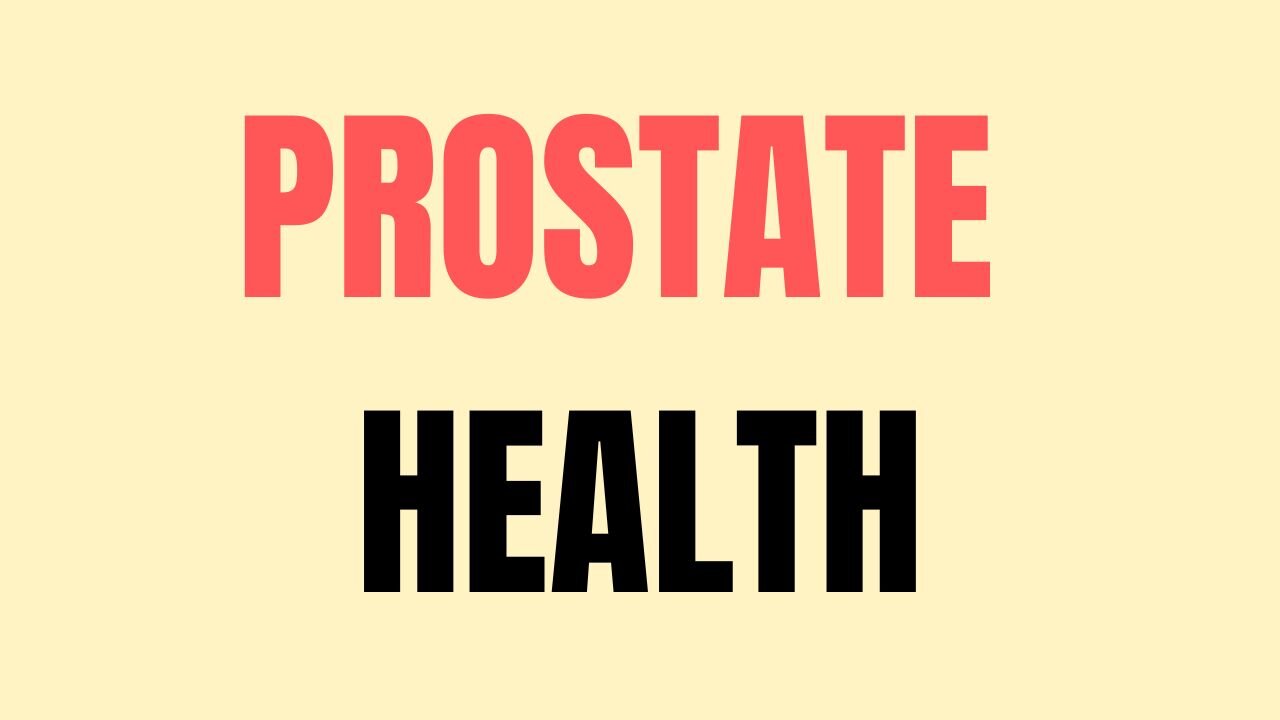Premium Only Content

Understanding Prostate Health - Raindrops1.com #malehormones #testosterone #male #hormones
Understanding Prostate Health
The prostate is a small gland located below the bladder and in front of the rectum in men. It's roughly the size of a walnut and plays a crucial role in the male reproductive system by producing seminal fluid, which nourishes and transports sperm. Maintaining prostate health is vital for overall well-being, especially as men age. This article explores the importance of prostate health, common prostate conditions, and how to maintain a healthy prostate.
Common Prostate Conditions
Benign Prostatic Hyperplasia (BPH)
What is it? BPH is a non-cancerous enlargement of the prostate gland that commonly occurs as men age. It can lead to urinary symptoms such as difficulty starting urination, a weak urine stream, and frequent urination, especially at night.
Symptoms:
Frequent urination
Urgent need to urinate
Difficulty starting urination
Weak urine stream
Inability to completely empty the bladder
Treatment:
Lifestyle changes (reducing caffeine and alcohol intake)
Medications (alpha-blockers, 5-alpha reductase inhibitors)
Minimally invasive procedures
Surgery in severe cases
Prostatitis
What is it? Prostatitis is inflammation of the prostate gland, which can be caused by bacterial infections or other factors. It can occur in men of all ages and is categorized into acute bacterial prostatitis, chronic bacterial prostatitis, chronic prostatitis/chronic pelvic pain syndrome (CP/CPPS), and asymptomatic inflammatory prostatitis.
Symptoms:
Pain in the groin, pelvic area, or genitals
Painful urination
Difficulty urinating
Flu-like symptoms (in acute bacterial prostatitis)
Treatment:
Antibiotics (for bacterial prostatitis)
Alpha-blockers
Anti-inflammatory medications
Lifestyle changes (diet, stress reduction)
Prostate Cancer
What is it? Prostate cancer is one of the most common cancers in men. It occurs when cells in the prostate gland grow uncontrollably. The risk of developing prostate cancer increases with age, family history, and certain genetic factors.
Symptoms:
Early stages often have no symptoms
Advanced stages may include difficulty urinating, blood in urine or semen, pain in the hips, back, or pelvis
Detection:
Prostate-Specific Antigen (PSA) blood test
Digital Rectal Exam (DRE)
Biopsy (if needed)
Treatment:
Active surveillance (for low-risk cases)
Surgery (prostatectomy)
Radiation therapy
Hormone therapy
Chemotherapy (for advanced cancer)
Maintaining Prostate Health
Regular Screening:
Men over 50 should discuss prostate screening with their healthcare provider.
Men with a family history of prostate cancer should consider earlier screening.
Healthy Diet:
Consume a balanced diet rich in fruits, vegetables, and whole grains.
Reduce red meat and high-fat dairy intake.
Include foods high in omega-3 fatty acids, like fish.
Regular Exercise:
Engage in regular physical activity to maintain a healthy weight.
Exercise can help reduce the risk of BPH and prostate cancer.
Hydration:
Drink plenty of water to support urinary health.
Limit Alcohol and Caffeine:
Reduce intake of alcohol and caffeinated beverages, which can irritate the bladder and worsen BPH symptoms.
Avoid Smoking:
Smoking is linked to an increased risk of prostate cancer.
Manage Stress:
Practice stress-reducing techniques such as meditation, yoga, and deep-breathing exercises.
Conclusion
Prostate health is a critical aspect of men's overall well-being. Understanding common prostate conditions, recognizing symptoms early, and taking proactive steps to maintain prostate health can help men lead healthier, more fulfilling lives. Regular check-ups and a healthy lifestyle are key components in preventing and managing prostate-related issues. If you experience any symptoms or have concerns about your prostate health, consult your healthcare provider for personalized advice and treatment options.
-
 1:05:19
1:05:19
Sarah Westall
14 hours agoDying to Be Thin: Ozempic & Obesity, Shedding Massive Weight Safely Using GLP-1 Receptors, Dr. Kazer
110K26 -
 54:38
54:38
LFA TV
1 day agoThe Resistance Is Gone | Trumpet Daily 12.26.24 7PM EST
75K12 -
 58:14
58:14
theDaily302
23 hours agoThe Daily 302- Tim Ballard
71K13 -
 13:22
13:22
Stephen Gardner
16 hours ago🔥You'll NEVER Believe what Trump wants NOW!!
119K347 -
 54:56
54:56
Digital Social Hour
1 day ago $12.53 earnedDOGE, Deep State, Drones & Charlie Kirk | Donald Trump Jr.
67.9K6 -
 DVR
DVR
The Trish Regan Show
18 hours agoTrump‘s FCC Targets Disney CEO Bob Iger Over ABC News Alleged Misconduct
71.6K44 -
 1:48:19
1:48:19
The Quartering
19 hours agoElon Calls White People Dumb, Vivek Calls American's Lazy & Why Modern Christmas Movies Suck!
151K114 -
 2:08:42
2:08:42
The Dilley Show
19 hours ago $37.76 earnedH1B Visa Debate, Culture and More! w/Author Brenden Dilley 12/26/2024
129K44 -
 4:55:59
4:55:59
LumpyPotatoX2
22 hours agoThirsty Thursday on BOX Day - #RumbleGaming
116K9 -
 1:04:52
1:04:52
Geeks + Gamers
21 hours agoDisney RATIO'D on Christmas Day | Mufasa Embarrassed By Sonic 3
85.1K13